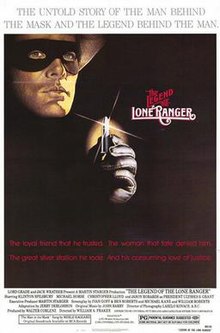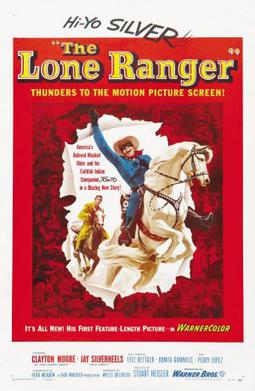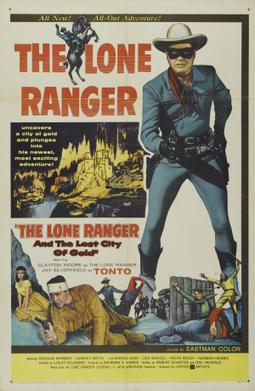From Wikipedia, the free encyclopedia
The William Tell Overture is the overture to the opera William Tell (original French title Guillaume Tell), whose music was composed by Gioachino Rossini. William Tell premiered in 1829 and was the last of Rossini’s 39 operas, after which he went into semi-retirement (he continued to compose cantatas, sacred music and secular vocal music). The overture is in four parts, each following without pause.
There has been repeated use (and sometimes parody) of parts of this overture in both classical music and popular media. It was the theme music for The Lone Ranger in radio, television and film.
| The Lone Ranger | |
|---|---|
| Theatrical release poster | |
| Directed by | Stuart Heisler |
| Produced by | Willis Goldbeck Jack Wrather |
| Written by | Eric Freiwald Herb Meadow |
| Screenplay by | George W. Trendle |
| Based on | The Lone Ranger |
| Starring | Clayton Moore Jay Silverheels Beverly Washburn |
| Music by | David Buttolph |
| Cinematography | Edwin B. DuPar |
| Edited by | Clarence Kolster |
| Production company | Wrather Productions |
| Distributed by | Warner Bros. |
| Release date | February 25, 1956 |
| Running time | 81 minutes |
| Country | United States |
| Language | English |
| Box office | $1,550,000 (US) |
The Lone Ranger is a 1956 Western film based on The Lone Ranger television series, starring Clayton Moore and Jay Silverheels. The Lone Ranger was the first of two theatrical features based on the popular TV series of the same name; the other one being The Lone Ranger and the Lost City of Gold (1958). This 1956 film was Bonita Granville‘s last film appearance. She retired from the screen to marry Jack Wrather.
Parts of the film were shot in Kanab Canyon, Barracks Canyon, and Johnson Canyon in Utah.
The film is recognized by American Film Institute in these lists:
- 2003: AFI’s 100 Years…100 Heroes & Villains:
- The Lone Ranger – Nominated Hero
- 2005: AFI’s 100 Years…100 Movie Quotes:
- The Lone Ranger: “Hi-Yo, Silver!” – Nominated
| The Lone Ranger and the Lost City of Gold | |
|---|---|
| Theatrical release poster | |
| Directed by | Lesley Selander |
| Produced by | Sherman A. Harris |
| Written by | Robert Schaefer and Eric Freiwald |
| Based on | Based upon The Lone Ranger legend |
| Starring | Clayton Moore Jay Silverheels |
| Music by | Les Baxter Song “Hi Yo Silver” by Lenny Adelson – Les Baxter |
| Cinematography | Kenneth Peach A.S.C. |
| Edited by | Robert S. Golden, A.C.E. |
| Production company | A Jack Wrather Production |
| Distributed by | United Artists |
| Release date | June 4, 1958 |
| Running time | 81 minutes |
| Country | United States |
| Language | English |
The Lone Ranger and the Lost City of Gold is a 1958 American Western film in Eastmancolor released by United Artists. The second of two theatrical features specifically based on and continuing the TV show The Lone Ranger it stars Clayton Moore and Jay Silverheels, reprising their roles from the TV series.[1][2] The first feature film was 1956’s The Lone Ranger. No further films based on this specific version of the characters were made after this one.
Watch the movie “The Lone Ranger and the Lost City of Gold”
| The Legend of the Lone Ranger | |
|---|---|

Theatrical release poster
|
|
| Directed by | William A. Fraker |
| Produced by | Walter Coblenz executive Martin Starger |
| Written by | Ivan Goff Ben Roberts William Roberts Michael Kane Gerald B. Derloshon (as Jerry Derloshon) |
| Starring | Klinton Spilsbury Michael Horse Christopher Lloyd Matt Clark Juanin Clay Jason Robards John Bennett Perry |
| Music by | John Barry |
| Cinematography | László Kovács |
| Edited by | Thomas Stanford |
|
Production
company |
|
| Distributed by | Universal Pictures |
|
Release date
|
|
|
Running time
|
98 minutes |
| Country | United States[1] |
| Language | English |
| Budget | $18 million or $13 million |
| Box office | $12,617,845 |
The Legend of the Lone Ranger is a 1981 American western film that was directed by William A. Fraker and stars Klinton Spilsbury, Michael Horse and Christopher Lloyd.
It is based on the story of The Lone Ranger, a Western character created by George W. Trendle and Fran Striker. Its producers outraged fans by not allowing actor Clayton Moore to wear the character’s mask when making public appearances, and created further bad buzz when the dialogue of leading man Klinton Spilsbury was dubbed by another actor, James Keach. The film was a huge commercial failure, and Spilsbury has not appeared in any films since.
The rights to the character had been bought in 1954 by Jack Wrather, an oil billionaire, and his wife Bonita Granville. They had made many attempts to create a Lone Ranger movie that would appeal to a modern audience, including making Tonto an equal partner and mentor to the Lone Ranger. By the late 1970s they believed that the story was ripe for retelling in an epic vein similar to Ilya and Alexander Salkind‘s Superman (1978), with the potential for sequels.
Five horses were used to play Silver.
Awards and nominations
The film was nominated for, and won, several Golden Raspberry Awards:
- Won: Worst Actor (Klinton Spilsbury)
- Won: Worst New Star (Klinton Spilsbury)
- Won: Worst Musical Score
- Nominated: Worst Picture
- Nominated: Worst “Original” Song (The Man in the Mask)










































































Comments